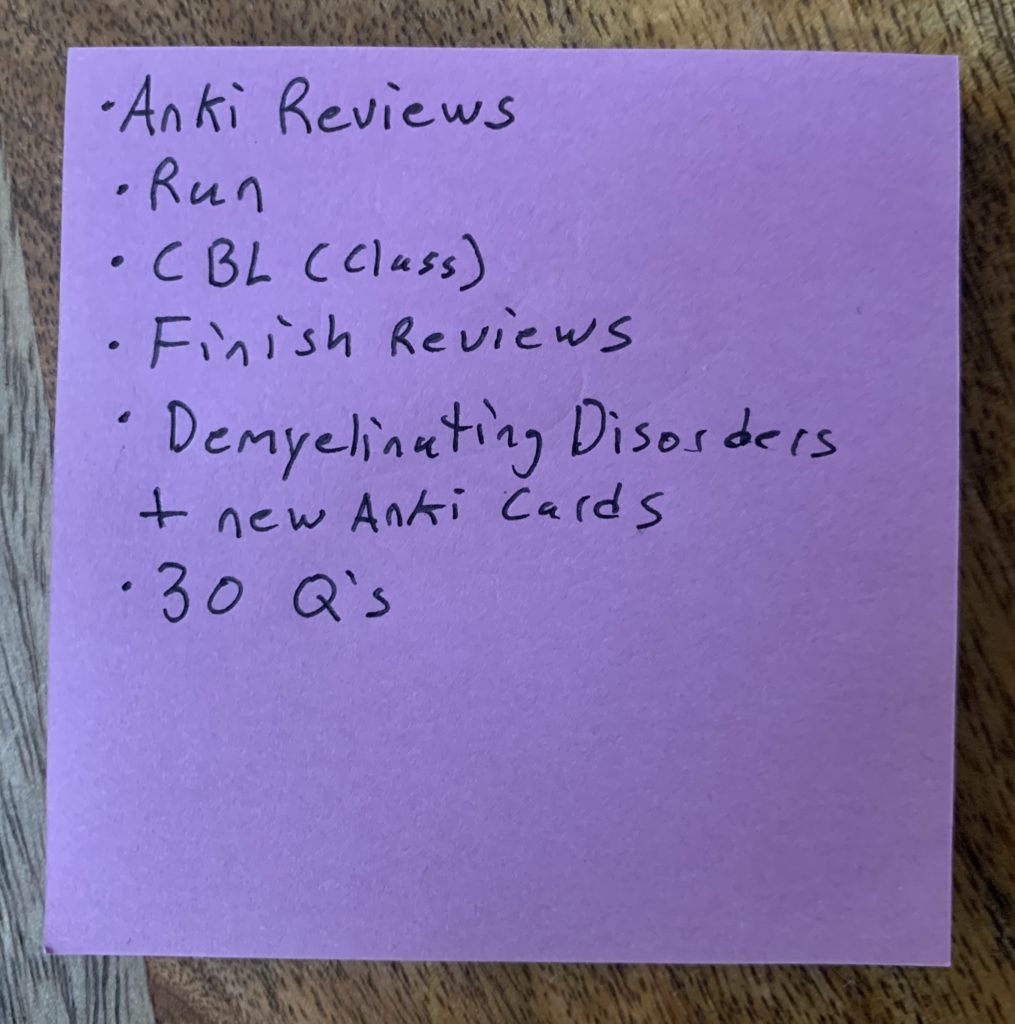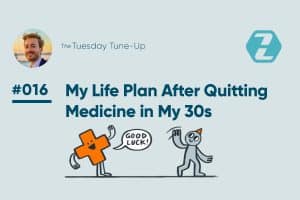I have a complete guide on how to use Anki, study better, and get better grades that I used (and 1,000’s of other students) have used when studying in medical school. If you are interested, you can check it out here!
Summarizing, highlighting, and rereading are poor studying strategies. Active recall, spaced repetition, and practice testing are evidence-based and effective studying strategies. You can check out the evidence in my posts here and here.
At the beginning of medical school, I was overwhelmed by the amount of information and needed to change my study strategy. What followed was an all-encompassing reworking of how I spent my time. The results? My grades went up and I studied less. How is that possible? In this post, I will show you how I take 0, yes 0, notes in medical school now score better and study less.
Side Note: I have tried to generalize this guide so you can use it in any field, apologies if some resources are more catered towards medical school. Also if you feel like you absolutely must take notes (you don’t) I wrote a post a year ago, on taking notes in medical school.
The Resources
There are a few applications and techniques I use that you should understand before going forward:
- Anki (Tips)
- Notability
- Pomodoro Technique
- Feynman Technique
- Medical School Specific Resources (Also can check out my specific daily routine for studying in medical school)
- Medical School Specific Anki (Setup guide, addons, advanced tips)
The Strategy
The core of this strategy is active recall, spaced repetition, and practice testing. These are my three pillars for studying. My entire strategy revolves around these three. I avoid, at all costs, highlighting, rereading, underlining, or summarizing. I explain why in my evidence-based post here.
In one sentence: plan, preview, view, review, test, repeat.
Let’s break this down.
Plan
Every week, the week before the thing I am learning I write down. What classes do I have on Monday? What laboratory will I have on Tuesday? I need to know what I will be going to so I can plan my studies.
Then I plan to study that information the day before class. Why are we doing this? One, the evidence supports it1, a good night’s sleep consolidates and optimizes our memories (our studying) from the day. Two when I show up to class with no knowledge on the subject the information has a chance to go completely over my head.
So, using my school as an example, Tuesday I may have a lecture on the layers of the skin, so, Monday, I would plan to teach myself about the layers of the skin. Have a good night’s sleep Monday and show up to Tuesday’s skin lecture prepared.
So why don’t I just plan out my entire semester? Well, I have found, looking and planning that far into the future is difficult. You may be busier one week than another, or life happens, a week seems the perfect amount of time for me to plan. Before exams, I plan 9-days out.
Ok so I know what I will be learning that week, I know how I will be studying that information the day before lectures, is there anything else?
One thing, that has made a dramatic impact on my stress levels, is, the night before, write out a detailed plan of what I will be doing the next day on a post-it. Then I just place that post-it on my computer. The next day as I proceed through the tasks, I only focus on the next task, until I can cross it off.
For example, here as an abbreviated example of what I might write down as a daily plan.

Ok so we know what we are going to study, how do we study?
Preview
So the day before lecture I preview the information, how exactly do I do that?
- Get a general idea of what the lecturer is trying to teach us, maybe it’s about disorders of the systole. What is systole? What heart valves are involved in systole? What is happening to blood pressure? (~2 mins)
- Learn all the terms – For example, I may not know what chordae tendinae are, so I will look that up, and then make a flashcard for it or not depending on how relevant I think it is. Mainly I just want to understand the terms (~10 mins)
- Watch a Summary Video – I find a video that matches the general theme of the lecture content. For medical school, there are specific resources I use, but for any other subject, I’m sure YouTube has something on it. Or read the chapter of the book (Once!). During this video I DO NOT TAKE NOTES, I just try and understand what is going on in the overall subject. Could I explain the topic to one of my friends if he/she asked? I try and actually do it, this helps confirm or deny whether I have a grasp of the information (Feynman Technique).
- Creat Relevant Flash Cards – This is where the magic happens. Start testing yourself right away by creating flashcards using Anki. Anki will then space out when you need to be tested again on this information based on its built-in algorithm.
Some points on creating flash cards
- DON’T MEMORIZE, Understand: When I first started using flashcards, I fell into the trap of memorization. I would show up to a test and realize I didn’t actually know how the heart pumped, or why someone may have aortic regurgitation. Instead, I had memorized silly facts like what gene mutation may cause hypertrophic cardiomyopathy and didn’t know what hypertrophic cardiomyopathy was… Now, this little fact is important, but the big idea is more important.
- Limit the # of Cards you Make: If you make a card for absolutely every piece of information you will never get through them all, and you will much more easily fall into the trap of memorization. If you are using a supplemental deck this is especially true as you will be doing premade cards AND your own cards. In fact, with the premade deck I have, I barely make any new cards, maybe 2 a day from incorrect practice questions.
- Make sure the cards you are making aren’t already in your premade deck: For example, I use a premade deck in medical school, most of the information is in this deck. There are only a few school-specific things that I need to learn. After previewing a topic I can usually find flashcards already made in this deck.
View
On the day of the lecture, I show up, or watch online, and just sit there. Sit there. Watch, listen, pay attention, ask questions, be involved, and interested. Usually, someone, if not you, is paying a good amount of money for you to be experiencing what you are experiencing right now.
As we are going through the slides, two or three times during the lecture, I will try to think, “What did I just learn? Could I create a question based on that content? Could I explain this to a friend?”
Then, in Anki, during lecture or shortly after, I will add a flashcard with that information to my Anki deck.
Use the above rules when thinking about making these cards.
Review
The day after the lecture I will review the flashcards I made. I don’t need to plan out timing or anything like that, Anki does it for me. Oh yeah, I will rarely, if ever, look at that lecture again. Remember how bad rereading is? Sure, if I don’t understand something on a flashcard, I may go back to that lecture, the source material, to make sure I understand what is going on, but that is the only exception.
Test
So now I have my Lecture and Anki combo working like a well-oiled machine. How do we kick it up a notch? What did I do that really start improving my grades? The paper about improving students’ study techniques found practice testing and distributed practice (spaced repetition) to be the highest utility techniques when compared to eight other study techniques.
I do practice questions, I do them often, and I make flashcards based off the questions I got wrong.
Find practice questions and do them. Does your teacher provide questions? Are there some online (I bet there are). How about the back of that textbook that you haven’t opened yet?
Once I’ve gotten a handle on the lecture material I do practice questions. If I get a question wrong I make a flashcard based on that question; bam, now I will never get that question wrong again.
Repeat
Repeat this process across all of your classes and you will improve, I know I did. This is not easy, however. I almost know how well it is working because it feels like my brain is working harder on flashcards and practice questions than when I would just scroll through a slideshow or read a chapter in a textbook.
Use the Pomodoro method and get to work.
Summary
Let’s put it all together:
- Plan the week before plan out how you will study the lecture material the day before the lecture. Then, every weeknight, write a detailed plan of what you will accomplish the next day.
- Preview the lecture material the day before.
- View the lecture material, focus, listen, you won’t be coming back to this slideshow again…
- Review the information you just learned by making/reviewing flashcards on that information.
- Test yourself with practice questions.
So what might an average day look like?
- Wake up, do all of your Anki Reviews (flashcards)
- Attend/Watch Lecture
- Review That Lecture Material with Anki and do Practice Questions
- Take a Break
- Preview tomorrow’s lecture material
- Go to bed
After you take your final exam, if you will never need that information again, just suspend those cards in Anki.
Final Notes
This is how I study in medical school. I haven’t taken notes for over a year now and have never scored higher on exams.
How I study for tests is slightly different, but applies the same general principles, if you want to check out how I study for tests I did a write up here.
If you want to change your grades you need to change your study strategy.
Good luck!
-Zach
Work Cited:
- https://www.ncbi.nlm.nih.gov/pmc/articles/PMC3768102/
- https://pubmed.ncbi.nlm.nih.gov/26173288/


13 comments
RavKm
Hi Zach! I totally love this and am trying it out for first semester at medical school. There is so much content and taking notes is not working! Quick question-How do you learn the key terms? Do you make a note of them on the lecture materials? Or create flashcards? My school is a Caribbean school so I need to capture lecture specific and step 1 content. Thank you!!
Zach
You will learn the key terms from the flaschards as you go on. When I am “previewing” the material I just look up the occasional word that I don’t know so I can understand the content, you will remember that definition for the next day where it will be further confirmed from lecture. Then, from your flashcards (pre-made AnKing deck) you will solidify your learning of those key terms.
goldi
What do you do when there is more than one lecture a day?
I have 3 different lectures every day.
How can one preview for three lectures and review three lectures and have time left for further learning?
Zach
Hey Goldi, I often have different lectures during the day as well. My entire days were mostly spent studying. You shouldn’t spend that much time on the textbook or lecture outside of class, like 0 time, if that helps at all. Prioritize what’s harder for you.
Maaz
I want to ask how much should the spaced the repetitions be SPACED
Zach
Hey Maas, check out my post on Anki. Anki will space out the repetitions for you.
https://zhighley.com/spaced-repetition-evidence-and-anki-tutorial/
Muski
Hey Zach. Thanks buddy for helping. I was just sinking in the hole because of my study techniques but this SAVED me.
I must tell you that i have been following many Productivity gurus (like ali, thomas, mathew) but yours was much better and it helped me!!
Zach
Thanks for the nice words! Good luck.
brian
Hey Zach. My medical school does not provide pre-made decks for their lectures so I am also worried that downloading a pre-made deck from online will not be specific to my lectures. Should I just make cards on my own? If so, I am concerned about the time it will take to make all of these cards. Would it be best to make cards based on concepts?
Zach
Hi Brian, if you go to a US mainland MD school the pre-made decks will serve you well. The material across all US mainland MD schools is fairly standardized.
Serjey
Thanks for doing this! I am an undergrad who is trying to better understand the material I am given. I had to adjust a couple of things from your methods, but so far it works very well. Only problem I have is looking for practice tests for the specific material. Do you make your own test or do you have practice tests available for you?
Zakaria
Thank you so much for your work , keep going..
Narglix
In your case you could use deck already created. If it was not possible you will create your own flash cards after lectures without taking notes ? If yes how many flash cards will you create this day ?